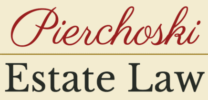Will Plans
The Last Will & TestamentWhat is a Last Will & Testament?
Probably the most well known estate planning tool is the Last Will & Testament. However, even this seemingly simple document is surrounded by a lot of misconceptions. Let’s begin with what defines a Will and how it works.
A Last Will & Testament is a legal document that states how a person wants their assets or real property to be distributed after they die.
Testator | Executor | Beneficiary
A Will requires three parties: (1) the Testator is the person who creates and signs the Last Will & Testament; (2) the Executor, or Executrix, is the person, named in the Will by the Testator, who is responsible for carrying out the Will and settling the Estate; and (3) the Beneficary or Beneficiaries is the person(s) named in the Will, by the Testator, to receive the assets or real property from the estate.
Let's Talk About Probate
Many people believe that if they have a Will they will avoid the court directed process of Probate. This is simply untrue. In fact, the very definition of “Probate” is “the official proving of a Will”. If you’ve ever closely experienced the probate process, you know exactly why it is desirable to avoid it at all costs. Let me begin with my own personal experience with this:
Probate is Time Consuming
In 2006, my father passed away and my younger sister was named the executrix of my parent’s estate. She hired an attorney for the probate action and the process took twenty months to complete. (Which, to me, was astonishing given the fact that all my parents had was their home and some money in the bank.) The process was a nightmare for my siblings and I. We couldn’t understand how something so simple could be so cumbersome. About one year into the process, I vividly remember having an argument with the probate attorney and I decided to look into what it was he was doing wrong – surely this had to be malpractice… Turns out, he was doing everything right – probate really does take nearly two years on average!
Probate is Costly
In addition to the lengthy headache my siblings and I experienced during the probate of my parents estate, it cost us about 10% of their entire estate. That may not seem like much, but do the math! Go ahead and add up the Fair Market Value of your home and property along with the value of any financial assets you currently possess. I guarantee that 10% of that sum total is higher than what you would want to spend on probate. Attorney fees, court filing fees, accounting fees, appraisal costs, inventory costs, bond premiums, executor fees…the expense adds up quickly. And here’s the thing…it’s an expense to your heirs! Probate is their headache, their time, their expense because you won’t be around to experience. Some people are fine with this. Others would like to know how this outcome can be avoided.
Probate is Public
Anyone, and I mean anyone, can walk over to their local courthouse and ask to see the Last Will & Testament of anyone on record. You might not want just anyone able to find out exactly how much money your children just inherited or where the location is of the property that just passed to them – especially if those children happen to be young and susceptible to fraud or scammers peddling “investment opportunities”. For some people, this may not be a concerning factor. I practiced criminal law for 15 years and, for me, this public aspect is a particularly unsettling downside to the probate process. I prefer to know that my affairs, and my children’s newly acquired assets, will remain private.
- Less Expensive than a Trust
- Expensive Probate Fees & Attorney Fees (for your heirs)
- Court Controlled
- Easily Contested
- Time Consuming (average process is 12-16 months in TN)
- Maximum Estate Taxes
- Public Disclosure of Assets, Debts and Heirs
- Maximum Negative Emotional Impact on Your Loved Ones
- No Probate
- No Court Control
- No Contest Clause
- No Hassels or Delays
- No Unnecessary Taxes
- Endless Distribution Creativity
- Private and Family Controlled
- Least Stressful for Your Loved Ones

Probate
The official proving of a will.
How Do I Avoid Probate?
You might be thinking, what if you don’t have a Will or any Estate Planning at all? Can you avoid probate by dying without a Will?
No.
When you die without a Will, your estate ends up going through the exact same process as if you did have a Will, thanks to the laws of “intestate succession”. Simply put, your assets will, by a judge, be ordered to look to your heirs in a specific order, and the judge will follow that order and distribute your estate accordingly.
A Trust is the most comprehensive method of avoiding probate because a Trust is the only Estate Planning tool that will allow for all of your assets to pass, as you intend, outside of the public, costly probate court process. A Trust plan is a cost that you take on during your lifetime so that your heirs don’t have to take it upon themselves at your death.
Which Documents Make Up a Will Plan?
In some instances, a Last Will & Testament really is the best tool for your estate planning needs. Should you decide that a Will is all you need, here are the documents associated and included with a comprehensive Will Plan at Pierchoski Estate Law:
- Last Will & Testament
A Will is a legal document that states how a person wants their assets or real property to be distributed after they die. When creating a Will, you name an Executor, who is the person responsible for carrying out the Will and settling the estate. In Tennessee, a Will must be signed by the Testator (creator of the Will) and two parties must sign as witnesses.
- General Durable Power of Attorney
A Power of Attorney (POA) is someone you designate to act on your behalf with regards to all financial or asset related matters. This person is appointed by a legal document called the General Durable Power of Attorney. It is important to note that this document lives and dies with its principal. People often make the mistake of thinking they can handle someone’s financial affairs for them after death because they are the POA. Read more about the ins and outs of a Power of Attorney here.
- Tennessee Advance Health Care Directive
In Tennessee, the Health Care Power of Attorney, sometimes referred to as a Health Care Proxy, is called the “Tennessee Advance Care Directive”. This legal document is a designation of the person that you would choose to make your medical decisions for you, should you become incapacitated. This document has the added benefit of dictating how you want certain health care situations handled. A health care power of attorney, on its own, does not always grant a release of your medical records. - HIPAA WAIVER
The Health Insurance Portability and Accountability Act (HIPAA) is a federal law, passed by Congress in 1966, that protects patients’ medical records and other personal health information. It is a common misunderstanding that a Health Care Power of Attorney can, on its own, give you access to someone’s medical records. By signing a HIPAA Waiver, you consent to your appointed agent, or agents, being able to gain access to your medical records. These are typically the same agents you would name in your Advance Care Directive.
- Final Disposition
This accompanying document is designed to let your heirs know what your wishes are for your end of life celebration! You can let them know where you have pre-need funeral arrangements, where you wish to be buried or cremated, etc. While this document is not legally binding, it’s a good place to let your loved ones know what you would have wanted so you don’t leave them guessing or overwhelmed at the sheer volume of these end of life questions. - Minor Guardianship
If you have minor children, we offer Guardianship Nomination Forms as a part of your Trust Plan. If something ever happens to you, these forms dictate your wishes for who you would want to become the permanent guardian of your minor children.
